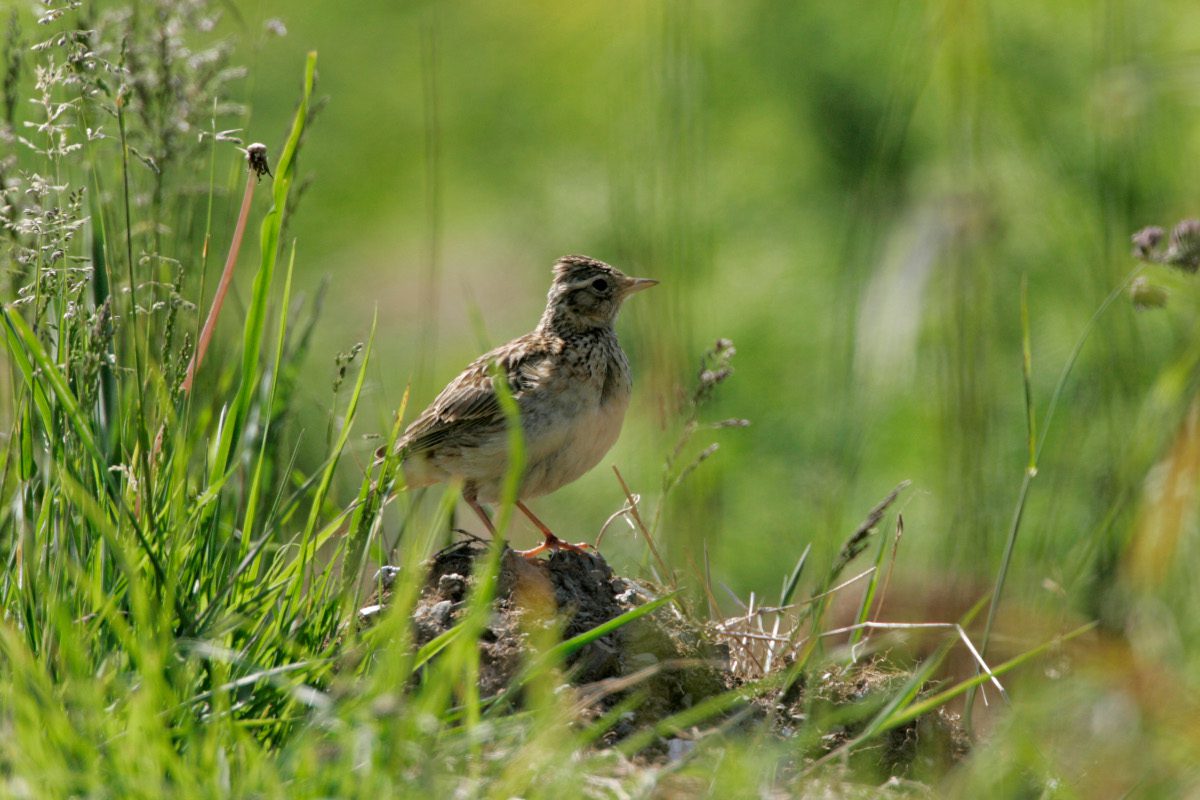
A extra strategic strategy to wildlife-friendly farming schemes is required to get well England’s farmland chicken populations, in accordance with a brand new research led by the RSPB.
A brand new paper revealed in January within the Journal of Utilized Ecology, with assist from the BTO and funding from Pure England, monitored how farmland chicken populations responded to totally different ranges of agri-environment schemes in arable, pastoral and combined farming landscapes.
The UK authorities has not too long ago launched a legally binding goal to halt species abundance declines in England by 2030, with related timebound EU targets presently beneath dialogue. With a lot of our beforehand widespread farmland birds comparable to Starlings and Skylarks in steep decline, there’s a urgent must quickly implement efficient conservation interventions throughout the farmed panorama, together with by way of the brand new Environmental Land Administration Schemes presently being developed and piloted in England.
This ten-year research measured modifications within the abundance of farmland birds on land managed beneath bird-focused lower- and higher-tier agri-environment schemes, in addition to land no bird-friendly farming initiatives.
Below the higher-tier scheme, a mean of 11% of the farm was dedicated to bird-friendly measures, whereas <4% was managed beneath the lower-tier schemes. The authors particularly studied bird-friendly measures that present seed-rich habitat for winter foraging, insect-rich habitat for feeding chicks, and nesting habitat for floor nesting species comparable to Lapwing. Greater-tier farms additionally acquired bespoke one-to-one administration recommendation previous to the beginning of their agreements.
The outcomes confirmed that when roughly 10% of a farm was dedicated to bird-friendly farming practices beneath the higher-tier scheme, this benefitted over half of the farmland chicken species in two of the three research areas. Though lower-tier provision usually failed to extend chicken numbers, it helped to maintain populations of some species, which continued to say no within the absence of agri-environment assist elsewhere.
The second a part of the research requested what quantity of the farmed panorama would must be positioned into higher-tier agreements to get well farmland birds by 10% over ten years. The reply was related within the two areas – 26% within the pastoral West Midlands and 31% in arable East Anglia.
Nonetheless, by concentrating on higher-tier agreements to farms that already maintain greater numbers of precedence farmland birds, this requirement drops to 17% and 21% respectively, which represents a big value saving. That is the primary research to make clear the quantity of nature pleasant farming that may be required to get well farmland birds at a panorama scale.
RSPB Conservation Scientist and lead writer of the research Dr Rob Hawkes mentioned: “That is the primary research to ask the query – how a lot nature-friendly farming is required within the English panorama to get well our depleted farmland chicken populations? Agri-environment schemes can solely get well farmland birds if adequate bird-friendly habitat is supplied at each the farm and panorama scales. There must be higher, extra strategic, considering when agreeing these nature-friendly packages.”
The research cautioned that some species with specialist necessities, just like the Turtle Dove, will want particular tailor-made habitat administration that’s rigorously focused to the websites the place the species remains to be hanging on. The generic bird-friendly measures examined on this research had no discernible advantages for this species.
Alice Groom, RSPB Senior Coverage Officer mentioned: “This analysis has landed as Governments from the 4 UK nations develop new agricultural insurance policies to interchange the EU’s Frequent Agricultural Coverage. This supplies a important alternative to design future agri-environment schemes which might be efficient and deployed at a adequate scale to get well farmland wildlife.
“Welsh Authorities have proposed making the ten% farm scale provision a common component of the Sustainable Farming Scheme. In England, Defra has but to set out how they’ll guarantee the brand new Environmental Land Administration scheme (ELM) contributes to the brand new legally binding targets to halt the lack of species abundance by 2030 and reverse it by 2042.”
While the research solely reviewed the affect of bird-friendly farming initiatives on farmland chicken populations, the authors recommend that these, and different wildlife-friendly schemes will profit extra than simply wildlife. Nature underpins our capability to supply meals and may present food-sustaining ecosystem providers like clear water and higher soils. Merely put, nature can enhance the resilience of the farming sector.






